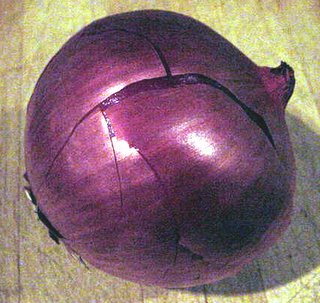Breaking Food News You Can Use Since 1985 - Mobi Media Food Reports & Reviews - Please Click On Logo For Most Recent Posts.
Tuesday, December 27, 2005
The 'Nun Bun' Has Been Stolen - You Bastards!
It was ineffable, it was inedible, but now it's gone. Early Christmas morning, an evil grinch pried the door off the Bongo Java cafe and got away with the cinnamon bun.
Before it was stolen, anyone who came into the cafe could see the bun. It sat on a shelf below the cash register. A large cup fill with change and a piggy bank sitting next to the roll were not taken. The roll, which was hard as a rock, had been there a while.
Ryan Finney, discovered the Nun Bun. When he first saw Mother Teresa in the bun, it made big news. Was it a miracle? Who knows? But Finney, who is not Catholic, has been watching over the roll ever since.
Bongo Java's owner Bob Bernstein, dubbed the bun, the Mother Teresa Cinnamon Bun and had T-shirts made up. Soon thereafter, he got a letter from Calcutta from Mother Teresa. The famous missionary didn't want her image or her name used for a commercial purpose. Bernstein decided then to call it the Immaculate Confection. Mother Teresa didn't like that either, so it became the Nun Bun.
According to Bernstein, Mother Teresa discussed the T-shirts bearing her likeness on her deathbed. Her lawyer asked her what she wanted to do about the Nun Bun. Mother Teresa laughed and pointed to her successor, Sister M Nirmala, and said, "find a roll that looks like her."
The Nun Bun Heist has brought the pastry some national publicity, once again. The story appeared on the front page of the Tennessean on Monday, and was covered by ABC and CNN as well.
Monday, December 26, 2005
Foodstuff of The Week: The Red Onion
 This week's featured foodstuff is the red onion. As simple as it is complex, the red onion works on so many levels. The research crew here found some history on the wwiz.com:
This week's featured foodstuff is the red onion. As simple as it is complex, the red onion works on so many levels. The research crew here found some history on the wwiz.com:
"The ubiquitous onion has a long, distinguished history and, like garlic, has been endowed with healing properties and mystical significance. For the ancient Egyptians, the onion's nine encircling layers represented eternity. Two thousand years ago, Egyptian princes were reputed to have spent 90 tons of gold buying them just to keep the workmen laboring on the pyramids in good health and spirits. That's a lot of gold and a whole lot of onions!
Throughout world history, onions have been thought of as food for the poor, since the strong odor and taste offended the palates of the wealthy. Yet history also reveals that onions were grown in the gardens of kings, such as Ur-Nammu of Ur in 2100 B.C.
The onion's spherical shape and concentric rings made it a powerful symbol for the universe and for the sun god. The round layers of the onion represented heaven, hell, earth and the universe. The form of the onion was a powerful image of divine perfection.
The vegetable itself was sometimes treated as a sacred object. Some Egyptians would swear their oaths on an onion, as a guarantee of good faith. Priests would not eat them, maybe as a sign of religious commitment or as a way of impressing the public with a feat of abstinence. Mourners and worshipers would sometimes bring onions as funeral gifts during the Old Kingdom period (c. 2615 to 2175 B.C.). A basket of onions was second only to bread as a valued offering. Onions appear in chapel altar pictures; in fact, Egyptian craftsmen would sculpt several vegetable forms in precious metals for the priests to use as temple offerings to the gods.
Still, the most intriguing fact about the onion as it existed in Egypt is in its relationship to the afterlife. According to James E. Harris and Kent R. Weeks, authors of X-Raying the Pharaohs: `They (Egyptians) recognized death, of course, but for them it was not the final, absolute end. Rather, it was the continuation of life in a different form. What they enjoyed and found pleasant in this life they tried to take with them in the next. To insure this, techniques of mummification were developed."
In this process, onions and garlic had both a spiritual and a physical role to play. The body of a deceased person had to be preserved for eternity to insure a "lasting home for the soul," and offerings, including food were placed in or near the tomb to be on hand in the afterlife. Sometimes real food was used, but sometimes scenes or sculpture depicted the items, which became ``real" through rites of magic. Some Egyptologists theorize that onions may have been used because their strong scent and/or magical powers would prompt the dead to breathe again. Other Egyptologists believe it was because onions and garlic were known for their strong antiseptic qualities, which were construed as magical and would be handy in the afterlife.
We do not know exactly when the onion reached Greece. According to Waverley Root in Food, by the time of the Athenian statesman Pericles (born c. 95 B.C.), the market of Athens was selling edible plants. Most of these vegetables were expensive and sold in small quantities, but onions were abundant–and affordable. That is probably why they were widely consumed, especially by the poor. It may also be why they were fed to soldiers.
The Israelites partook of Egyptian onions before Moses let them into Canaan. In the book of Numbers, in the story of the hardships of the odyssey, the Israelites speak fondly of the foods they had enjoyed and leeks, onions and garlic were among the six things that were mentioned.
Centuries later, Pliny the Elder, Rome's keen-eyed observer, wrote of Pompeii's onions before he was overcome and killed by the volcano's heat and fumes. Excavators of the doomed city would later find gardens where, just as Pliny had said, onions had grown. The bulbs had left behind telltale cavities in the ground.
From ancient times, onions have marched through history, a staple and universal foodstuff. They remained that way until the dawn of science, awaiting the magic of contemporary botanists, who would make the humble onion blossom into a bewildering array of shapes and forms.
Today onions are still so important that they are incorporated into everyday sayings, i.e. the French sometimes say, "Occupe toi de tes oignons" (Mind your business.)
Sunday, December 25, 2005
500-Pound Man Accused of Fast-Food Grifting
 Thanks to a loyal reader we have this story to share from you from the Local6 Florida News: "A 500-pound man in Seminole County, Fla., was arrested Tuesday on suspicion of scamming fast-food restaurants out of large amounts of milk shakes and tacos, according to a Local 6 News report. Jolicoeur would then call or visit the restaurants posing as a police officer or a firefighter and ask for a refund because there was a hair in his food, according to the report. "He would come back and say, 'Oh, there is something wrong with it,'" Seminole County Sheriff's spokesman Steve Olson said. "There was a hair in my shake or there was a hair in my tacos. And, then he wants his money back. "Jolicoeur was captured after he went to a Steak N' Shake restaurant near Oviedo and Taco Bell in Central Florida and allegedly tried to get money back for the food he ordered. Local 6 News reported that Jolicoeur has been arrested more than 24 times on charges of burglary, drugs and domestic problems, Local 6 News reported. "Jolicoeur's rap sheet is as thick as a book," Local 6 reporter Chris Trenkmann said. "When he was first checked into the jail in 1991, he weighed 360 pounds. This morning, the jail weighed him at 500 pounds."
Thanks to a loyal reader we have this story to share from you from the Local6 Florida News: "A 500-pound man in Seminole County, Fla., was arrested Tuesday on suspicion of scamming fast-food restaurants out of large amounts of milk shakes and tacos, according to a Local 6 News report. Jolicoeur would then call or visit the restaurants posing as a police officer or a firefighter and ask for a refund because there was a hair in his food, according to the report. "He would come back and say, 'Oh, there is something wrong with it,'" Seminole County Sheriff's spokesman Steve Olson said. "There was a hair in my shake or there was a hair in my tacos. And, then he wants his money back. "Jolicoeur was captured after he went to a Steak N' Shake restaurant near Oviedo and Taco Bell in Central Florida and allegedly tried to get money back for the food he ordered. Local 6 News reported that Jolicoeur has been arrested more than 24 times on charges of burglary, drugs and domestic problems, Local 6 News reported. "Jolicoeur's rap sheet is as thick as a book," Local 6 reporter Chris Trenkmann said. "When he was first checked into the jail in 1991, he weighed 360 pounds. This morning, the jail weighed him at 500 pounds."
Police in Sanford, Fla., and other cities are investigating the possibility that Jolicoeur was scamming area restaurants, Trenkmann said.
More info to come as we are following this unique story closely.







